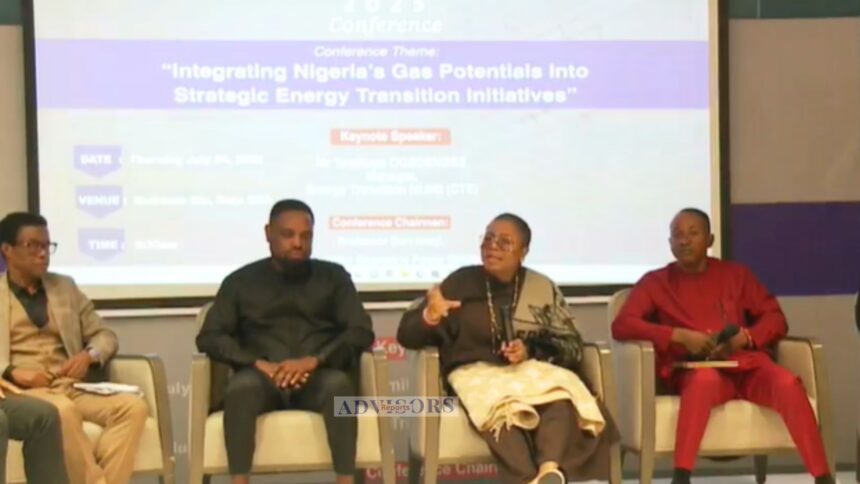says “Over 500m scf of Neconde Gas ‘unaccounted for’ in NGIC pipeline
Oredola Adeola
Engr. Chichi Emenike, Acting Managing Director and Gas Asset Manager of Neconde Energy Limited, has raised alarm over the huge financial burden stifling Nigeria’s energy transition efforts, rent-seeking regulations, dollarised operations, and policy inconsistencies are discouraging investment in the sector.
Emenike made this remark during a panel session at the Oriental News Nigeria 2025 Conference in Lagos on Thursday.
Speaking on the theme of the conference: “Integrating Nigeria’s Gas Potential into Strategic Energy Transition Initiatives,” Engr. Emenike challenged the Government to stop stifling investment, give gas investors time to breath.
She explained that the gas value chain works as a handshake and that if one operator fails, the entire chain is disrupted.
She therefore charged the government to stop trying to dictate for investors, rather focus on being an enabler.
According to her, Neconde, for instance, has gas that has been produced and supplied to the electricity generation companies (GenCos) and that has not been paid for almost two years now.”
“This is a serious conundrum, whereas we have sourced funds from somewhere to produce these gas molecules from our facilities. How am I going to pay back?”
Engr. Emenike further stated that a significant amount of gas produced by Neconde is usually lost when supplied to the gas transportation network.
She said, “I have over 500 million standard cubic feet (scf) of natural gas that is hanging in the NGIC pipeline, reported as ‘unaccounted’ for by that company.
“Multiply that volume with $1 or $2 and you can imagine how much that is.
“Whereas so much money went into drilling some of these wells, it costs between $35,000,000 and $40,000,000, plus or minus, and that is outside other assumptions of fees,” she noted.
Emenike further noted that natural gas economics must be end-to-end.
According to her, “Gas investors should be able to tie their investment to a commercial arrangement, before drawing down the first financing.
“When you have a business, as much as you think you know, in the case of Nigeria, once you put your leg out in this economy, you will see so many things flood in unexpectedly.
“You will realise that your IRR (rate of return) goes down the drain due to policy flip-flops and multiplicities of levies and fees,” she said.
The Acting MD of Neconde insisted that the sector needs regulatory reforms and an end to what she described as rent-seeking behaviour by government agencies.
“We have to deal with the rent-seeking attitude of our regulators to enable investors repatriate their investment financing.
“They should stop flogging investors with all forms of regulations and later charge them with potential incidents of non-conformity, which translates to fines, even for not operating, after they have created the crisis,” she said.
Emenike further explained that Nigeria’s upstream gas production is highly dollarised, making it costlier than crude oil development and difficult to sustain without a commercially viable framework.
She said, “The upstream natural gas production sector is highly dollarised, including the requisite inputs.
“There is no part of the operation, including the technology, that is produced locally. The bulk of it has to be imported in US$.
“The O&M, well drilling, and accessories to drill a gas well are all dollarised.
“So, it costs more than what it costs to drill a crude oil well. The handling of a gas well is highly sophisticated, unlike that of crude oil.”
The Ag.MD of Neconde called for urgent clarity on Nigeria’s position in the energy transition and a realistic approach to funding.
“Where do we sit as Nigerians today on this energy transition plan? Where is the money to run the transition?
“Government needs to focus inwardly and begin with achievable solutions.
“There is much more to be gained if we have a very selfish Nigerian plan that focuses on Nigerian interests alone. We can service the entire Gulf of Guinea, if we are serious. Let us start with the small gas fields.
Calling for collaborative efforts, Gas Asset Manager of Neconde Energy Ltd. advocated infrastructure sharing and coordination by operators within the value chain.
She said, “We need to leverage infrastructure to unlock the stranded assets across the country. We need to look at how to put together our war chest to achieve a lot for the industry. We need to set the rules of the game.”
Emenike called for a pragmatic national energy plan rooted in achievable goals rather than lofty ambitions, stressing the need for a unified national approach.
She stated, “We need to sit down once as a nation to be selfish enough to determine what is needed to take care of Nigeria’s economy alone in the Gulf of Guinea.”
“Let us start with what is doable; I mean the low-hanging fruit. Let us stop with big numbers. We should tidy up small fields that are struggling to juggle both CAPEX and OPEX.
“Presently in Nigeria, it is difficult for a gas investor to determine end-to-end where the return on investment would be coming from.
“We need a strategy; we need to be serious. Or else, gas investors would rather take what they should have invested in the Nigerian economy to Mozambique or elsewhere.”
“Stop trying to dictate what is going to happen in the market.
“The government should not create a monopolistic environment that stifles investment. They should allow it to have that flexibility.”
“Government has no business in business. They should stop the rent-seeking attitude and stop looking for short-term benefits. Quick fixes will not work,” she warned.




